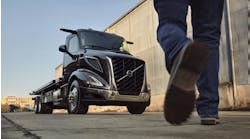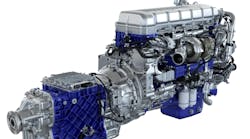Volvo to release electric truck next year in Europe
Volvo Trucks plans to introduce its first all-electric truck for commercial use, the Volvo FL Electric, in Europe next year. The truck's lithium-ion batteries would have up to 185-mile (300 km) range on a single charge and could quickly recharge in less than two hours.
The e-truck is designed for urban distribution and refuse operations, among other applications, according to a company announcement this week. Sales and series production of the new model will start in Europe in 2019.
"We're immensely proud to present the first in a range of fully electrically-powered Volvo trucks ready for regular traffic. With this model we are making it possible for cities that aim for sustainable urban development to benefit from the advantages of electrified truck transports," said Claes Nilsson, president of Volvo Trucks.
Volvo Trucks' sister company Volvo Buses has sold more than 4,000 electrified buses since 2010. The technology used for propulsion and energy storage in the Volvo FL Electric, the company noted, has been thoroughly tried and tested from the outset and is supported by Volvo Trucks' far-reaching network for sales, service and parts supply.
"In order to make the transition secure and smooth, we will offer holistic solutions based on each customer's individual needs regarding driving cycles, load capacity, uptime, range and other parameters," said Jonas Odermalm, head of product strategy Volvo FL and Volvo FE at Volvo Trucks. Such a solution may encompass everything from route analysis and battery optimization to servicing and financing. Volvo Trucks works closely with several suppliers of charging equipment. The aim as always is to offer customers high uptime and productivity."
"From experience, we know how important it is that cities, energy suppliers and vehicle manufacturers cooperate in order for large-scale electrification to become a reality. With attractive incentives, agreed standards and a long-term strategy for urban planning and expansion of the charging infrastructure, the process can go much faster," Odermalm added.
In its announcement, Volvo Trucks noted the company takes "a holistic view of electrification of the transport sector to handle the ongoing challenges in areas such as electricity generation and batteries."
"For instance, in order to ensure that raw materials for the batteries are extracted in a responsible way, the Volvo Group works with the Drive Sustainability network, which has a special function that monitors this issue," Odermalm said. "The Volvo Group is also involved in various projects where batteries from heavy electric vehicles get a second lease of life, reused for energy storage. All the questions about handling of batteries have not yet been solved, but we are working actively both within the Group and together with other actors to drive development and create the necessary solutions."
The first trucks in the Volvo FL Electric range are now entering regular operation with customers in Gothenburg, Sweden, the home of Volvo Trucks.
Volvo FL Electric Specs and notes:
- Fully electrically-powered truck for distribution, refuse collection and other applications in urban conditions, GVW 16 tonnes.
- Driveline: 185 kW electric motor, max power/130 kW continuous output, two speed transmission, propeller shaft, rear axle. Max torque electric motor 425 Nm. Max torque rear axle 16 kNm.
- Energy storage: 2-6 lithium-ion batteries, totalling 100-300 kWh.
- Range: Up to 300 km (186 miles).
- Charging: AC charging via the mains grid (22 kW) or DC fast charge via CCS/Combo2 for up to 150 kW.
- Recharging time: From empty to fully charged batteries: fast charge 1-2 hours (DC charging), night charge up to 10 hours (AC charging) with maximum battery capacity of 300 kWh.
- The first two Volvo FL Electric trucks will be operated by refuse collection and recycling company Renova and haulage firm TGM.
- The Off Peak City Distribution project studied the effects of goods transport at night in central Stockholm. By avoiding peak hour traffic the trucks were able to do their jobs in one-third of the time compared to daytime operation.


